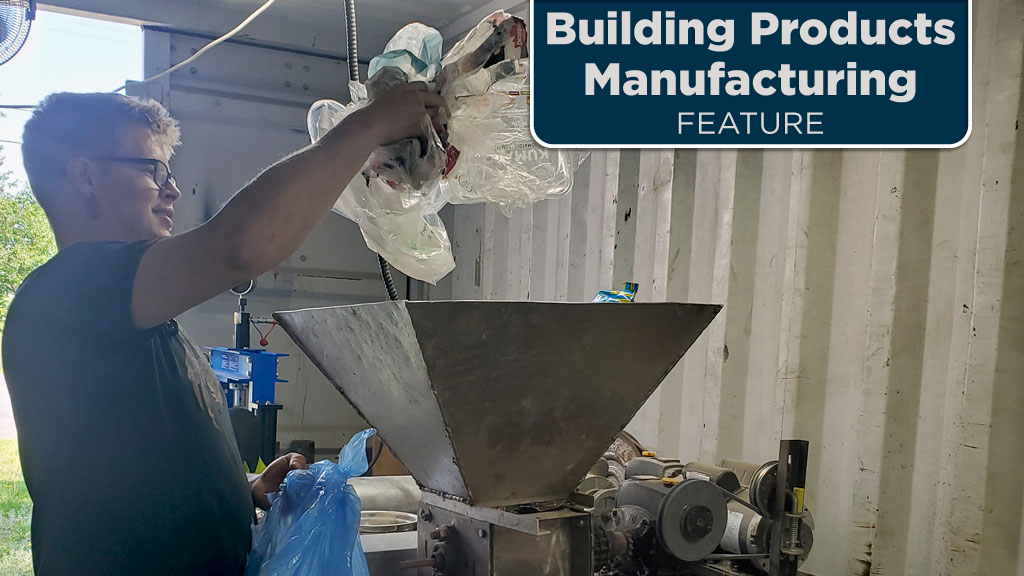Dustin Bowers is scouring the farms of the Atlantic Provinces for recyclable plastic waste to reuse in a line of interlocking plastic bricks and wall panels.
The 33-year-old, who has spent close to three years developing the Lego-like bricks for buildings, says when they are ready for market they will be an easy to install system that can save builders time and money “and still be environmentally responsible.”
Comprised of 90 per cent recycled materials (primarily agricultural plastic waste), the large bricks will weigh 25-30 pounds each — about 20 per cent less than similar-sized concrete blocks. The only virgin additives are inhibitors and stabilizers, says Bowers, CEO and founder of PLAEX Building Systems, based in Hampstead, N.B.
“We’re making a composite material akin to concrete,” he points out.
So far, the product has performed well in tests in a certified-materials testing lab tied to the University of New Brunswick.
“It has some limitations but for a wide-range of applications (including residential) it is going to be a game-changer,” says Bowers, whose start-up company was formed in 2020.
For now, however, the PLAEX CEO sees his mortarless interlocking plastic bricks for non-occupant applications, such as retaining walls for flood protection.
The company’s goal is to press the first test bricks in the fall. Structural testing will follow in a certified lab.
A pilot project is slated for year’s end or early next spring, says Bowers, adding the company is hoping to set up its first production facility over the winter.
Bowers, who grew up around construction tools and equipment in small-town New Brunswick, says the idea for the business came to him after working for years in construction and seeing “massive amounts of waste off every project.” Confounded by the building industry’s motives not to change course, he set his sights on developing a sustainable alternative.
The company has been mapping out farm waste supply across the Atlantic Provinces and is investigating the possibility of setting up mini transfer (waste) stations with farms to ensure a ready supply of recyclable plastics. Examples include greenhouse plastic sheets, plant row covers, maple syrup tubing and plastic silage waste from beef producers.
PLAEX is also looking for recyclable plastic from the marine industry.
The first wall system line under development is water-resistant to be followed by a line of waterproof wall panels that contain material from recycled tires, he says.
The impact-resistant brick will be impervious to freeze-thaw cycles which can undermine traditional masonry products.
Bowers says the start-up has taken advantage of opportunities for federal and provincial government grants for green tech products and has garnered assistance through the agricultural industry. Much of PLAEX’s early development funding and mentorship has come through accelerators such as Volta, a non-profit innovation hub, and Energia Ventures based in Fredericton, N.B.
Bowers says while the company’s in-house recycling process is still being fine-tuned with the assistance of partners, the process can handle “much more contaminated (plastic) waste than any other system” that he is aware of.
The start-up founder is exploring opportunities to partner with other manufacturers to produce a host of recycled materials for whole building integration. “We envision this developing into a plug-and-play building/eco system.”
The opportunities for green development supported by government incentives have significantly increased recently as more people (and governments) are waking up to the reality of climate change, he points out.
Inspired by his father, a licensed insulated concrete form systems contractor, Bowers “took a dive into the business” in 2020 just as the pandemic started. Hurdles aside, he says COVID-19 has allowed for “extra focus” on product development.
Ziggy Last, Ontario operations manager, Sto Canada, has acted as an advisor to Bowers on performance criteria tests the product must pass to meet the widest possible usage under building codes.
Important testing includes for fire safety in residential and or commercial scenarios, says Last, who has 40 years of experience in construction, including materials testing to ensure Sto’s products meet changing building code requirements.
“I fully support his endeavor on many levels,” Last says.
Bowers is “quite certain” PLAEX bricks will achieve certification for residential applications. “Obviously there is going to be a height limit for this material but we envision it for a wide range of low-rise residential…two-, three-storey, maybe four storeys.”



Plastic mulch is used on beds in much of the southeastern united states. There is a tremendous waste problem. Could this plastic be used for your product?
Any less plastic in nature is better. I do not like plastic house in nature